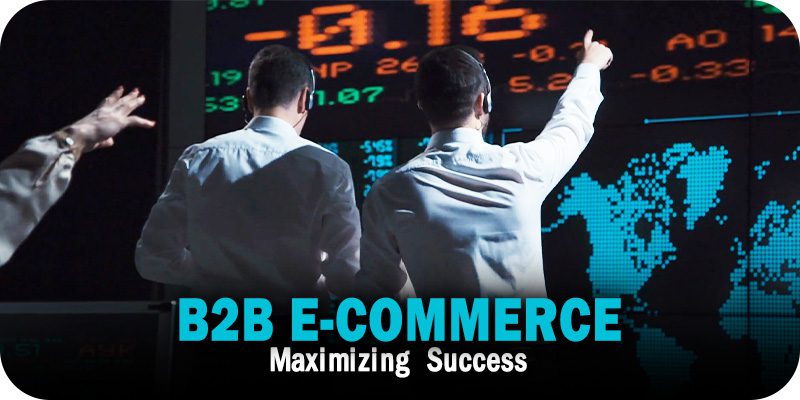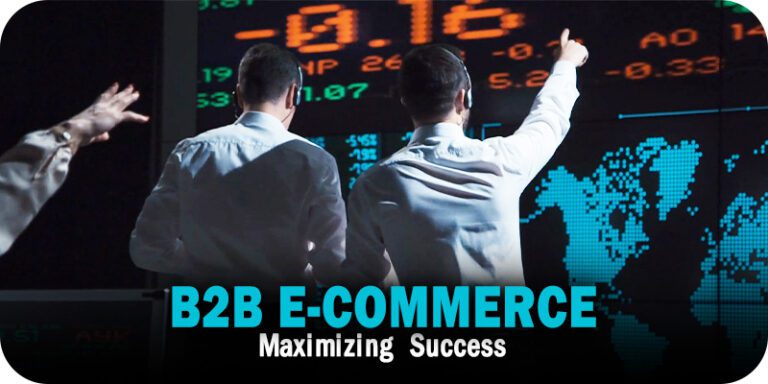Maximizing B2B E-Commerce Success: How Cloud Platform Providers Can Help You and Your Customers


As part of Solutions Review’s Contributed Content Series—a collection of articles written by industry thought leaders in maturing software categories—Jess Warrington, the General Manager of North America at CloudBlue, explains how cloud platform providers can help businesses maximize their B2B e-commerce success.
Your storefront is your calling card, and in a digital-first world, forward-looking companies are setting up B2B marketplaces that offer a user-friendly, one-stop-shop experience. Similar to how Amazon provides a simple online platform for consumers and sellers, with a B2B marketplace, you run your marketplace and control the customer experience.
Digital marketplaces are the fastest-growing channel in B2B eCommerce. Post-pandemic, these marketplaces are now part of the mainstream of eCommerce in various sectors—from hi-tech to healthcare to travel and hospitality. While an increasing number of enterprises understand the importance of digitizing sales and services, many often struggle with execution.
Leaning on a cloud platform provider for integration can make building your digital marketplace more manageable – positioning your business to grow a recurring revenue stream with a broader product catalog and setting yourself up with a more resilient supply chain.
Embracing a Digital Ecosystem
Digital marketplaces allow companies to expand their reach without having to generate inventory or invest in physical infrastructure. Building a seller network, or digital ecosystem, can help businesses grow their eCommerce revenue by simplifying connections between channel partners through a centralized point.
You can set up your digital marketplace and offer customers more products and services from other companies. And in turn, you can sell your services through third-party marketplaces, giving you access to an expanded customer base and making it less expensive to get new customers.
Cloud platform providers, also called marketplace operation applications (MOAs), enable businesses to build digital ecosystems. MOAs accelerate time to revenue by managing subscription and billing, vendor and product information, and partner acquisition across multiple channels.
The need for MOAs continues to grow. According to Gartner’s latest Market Guide for Marketplace Operation Applications, more businesses are turning to MOAs to support a wider variety of products, services, and digital goods to offer total solutions for customers.
In the crowded e-commerce landscape, improving the customer experience (CX) is paramount. Yet there seems to be a disconnect between how well businesses handle CX and what customers think. According to a survey by Emplifi, 87 percent of companies felt they provide excellent CX, while only 11 percent of customers agreed.
Collaboration with your marketplace partners can help cultivate customer loyalty because when you offer your customers a suite of products and services, you provide them with the convenience of a one-stop shop. Digital marketplaces generate recurring revenue through subscription-based or pay-per-use models, creating more opportunities to cultivate and enhance ongoing customer relationships.
Digital Transformation Enables You to Scale Faster
Digital ecosystems provide the added value of partnerships with other companies and a network of connected products and services while sharing resources and expertise. Legacy companies have transformed from completing simple sales to offering services from channel partners on their digital marketplaces.
For example, when Lenovo sells a laptop, Microsoft 365 or Google Workspace is included, along with other productivity services. These bundled services are something business customers have come to expect—customers buy a product, plus they get a subscription for software-as-a-service (SaaS) or data storage and cybersecurity. Creating bundles across multiple sellers allows companies to upsell and cross-sell.
The important outcome of offering these bundles is that it helps simplify your customers’ operations and reduces costs by allowing customers to pay for what they use when needed. This also eliminates the need for long-term commitments to product updates and maintenance.
A Cloud Platform is the Engine Behind the Marketplace
Offering cloud subscriptions allows you to create and deliver product combinations for your customers. But the more add-ons you offer from other companies, the more complex managing those subscriptions can become without a proper system.
One of the strengths of MOAs is catalog management. Businesses that navigate the digital marketplace landscape best utilize MOAs to add new products efficiently and automate the process as new data comes in. As your business scales into new markets, streamlining catalog fulfillment and management enables you to offer more personalization to your customers.
Efficient business processes to manage your partner relationships can also help you decrease costs. According to Gartner, however, due to the complexity of back-end operations and many companies are new to the digital marketplace, the process often requires a great deal of guidance in planning and ongoing reviews.
It would take too long and use up a lot of in-house resources trying to build a digital ecosystem from scratch. Setting up an online store and waiting for sales is not feasible. When developing digital marketplaces, it is crucial to identify the channels your business customers are already using. You should consider joining an established ecosystem that houses your target audience and offers the potential to reach new customers.
Understanding how to navigate your entire digital ecosystem is essential to providing a seamless customer experience. Business customers behave like online consumers, and they expect an omnichannel experience from other businesses, where they can view product information across all channels through one source. Like regular consumers, business customers rely on online shopping more than ever. Establishing yourself in the B2B eCommerce space is mission-critical in the digital world of modern business.






















